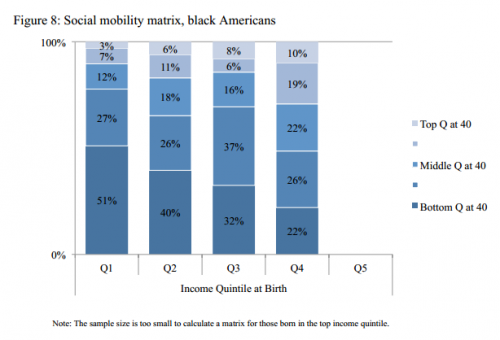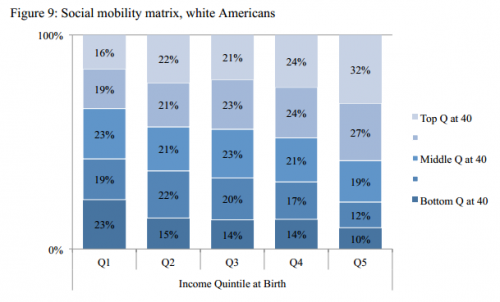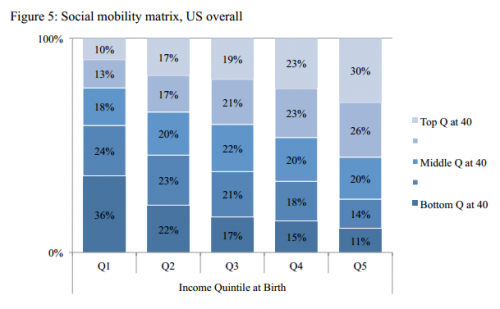Social mobility refers to likelihood that a person born in one social class will end up in another as an adult. A new study by Richard Reeves and Isabel Sawhill for the Brookings Institute offered a devastating picture of the possibilities for black youth. To summarize: most black children see downward mobility and are poorer as adults than they were as children.
 More than half of black children born into the poorest 1/5th of households will remain there as adults. That’s only true for 36% of similarly-situated Americans overall. Poor black children, then, are less likely than Americans in general to be able to escape poverty.
More than half of black children born into the poorest 1/5th of households will remain there as adults. That’s only true for 36% of similarly-situated Americans overall. Poor black children, then, are less likely than Americans in general to be able to escape poverty.
Black children born into the middle class — literally the middle 5th of Americans as measured by household income — overwhelmingly see downward mobility. 16% will remain somewhere in the middle, 14% will be richer than their parents, and a whopping 69% will end up less economically stable. In comparison, only 38% of Americans, overall, born into the middle 5th see a decline in their status as adults.
As you may have noticed from the hole in the far right of the chart, the researchers didn’t have enough cases to even estimate outcomes for blacks born rich.
Below is the data for whites (first) and all Americans (second) for comparison:

 Here’s the first author, Richard Reeves, explaining social mobility, using Legos of course:
Here’s the first author, Richard Reeves, explaining social mobility, using Legos of course:
H/t Joe Feagin. Cross-posted at Pacific Standard.
Lisa Wade, PhD is an Associate Professor at Tulane University. She is the author of American Hookup, a book about college sexual culture; a textbook about gender; and a forthcoming introductory text: Terrible Magnificent Sociology. You can follow her on Twitter and Instagram.
Comments 4
Bill R — November 15, 2014
Here's another unfortunate example of failing to describe the complexity of the phenomenon or offer even a sliver of explanation for it. The thread is provocative as usual. Informative? Not so much.
For example: Researchers who study social and economic mobility in the US often grapple with the fact that geography appears to be the one of the most telling factors. IMMOBILITY in America is heavily concentrated in the south, from southern Virginia to Mississippi. And while that area is heavily populated by blacks, whites and hispanics who live there also suffer from low mobility. Separating the effects of locale and race would be beneficial to developing a better understanding.
Social science is difficult work. Pretending complex phenomena are simple does injustice to the science and its students. who come to believe the field is more about complaining than understanding. This should not stand.
Social Class Links 11/18/2014 | Education and Class — November 17, 2014
[…] Chart of the Week: A Majority of Middle Class Black Children Will Be Poorer as Adults » Sociologica… […]
UPDATE: CDC Stands Behind Report That Half Of Black … | Herpes Survival Kit — December 29, 2014
[…] The March reports of sky-high levels of the genital herpes virus among black women set off a firestorm of disbelief and recrimination. ... REPORT: Nearly Half Of All Black Women Have Herpes · OPINION: Is There A Conspiracy ...The March reports of sky-high levels of the genital herpes virus among black women set off a firesto… […]